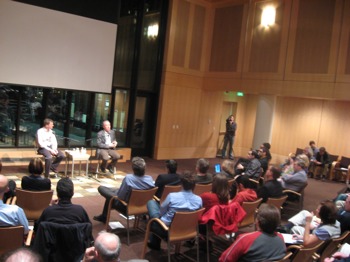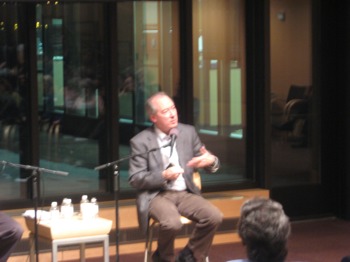I attended an event Monday night sponsored by the Society of Professional Journalists/MN Chapter, billed as "New Media, New Standards? Ethics in Online Journalism." It was held at the very impressive MPR facility in downtown St. Paul, and I was surprised to see about 200 people showed up. 
It was mostly members of the local traditional media — reporters, editors, producers, etc — and I’d say it skewed toward senior-level people. There were some academics in the audience, too. And I’d estimate a good 30 to 40 of us independent bloggers came out as well, even though we weren’t really actively invited (to my knowledge, anyway). The event was open to the public, and I actually learned about it from the featured speaker, Dan Gillmor. I just happened to notice on his blog that he had Minneapolis listed in his upcoming travel plans, so I asked him was that was about. Dan was the main reason I wanted to be there, because I have a lot of respect for the man. I’ve met him on a couple of occasions, most recently at DEMO in January, and I always enjoy reading his columns in PR Week.
I Twittered live from the event here (scroll down to a series of posts dated February 25). But I thought I’d also do a little followup post here, as I realized there were three very important takeaways from this event that deserved calling out (and all three confirmed my own suspicions):
1) The New York Times is in state of bigtime decline. Gillmor says the Times "screwed up" on the McCain insinuation story. "They’ll pay for it, and I’m most disappointed they still aren’t admitting it." How many occurrences of editorial screwups do people need to see from this paper to realize it’s dying? And the fact that Marc Andreessen has declared a "NY Times deathwatch" on his blog is only more evidence of that. Of course, his argument is more from a business standpoint, since they’ve become the best example of the dying newspaper business model. But, for me, the combination of Andreessen’s call and Gillmor’s shock at their editorial demise is enough. Stick a fork in it.
2) Transparency. Dan said bloggers understand and practice it, but traditional journalists
don’t. I was heartened by Gillmor breaking this to the audience (not that they shouldn’t have known it already). I started what I think was one of the best discussions of transparency way back in November 2006, when Mark Glaser picked up on something I said and posted about it on his very well respected MediaShift blog at PBS.org. I spoke my piece pretty well there. I’m starting to realize that the fact the mainstream media is widely perceived as biased may largely be due to its journalists not being
transparent as individuals, about their own biases, whether by choice or
because their employers’ policies don’t require them to be. But, net-net, because Dan Gillmor pointed this out, I’m gathering that this
notion of transparency still hasn’t sunk in with the traditional media crowd.
3) Readers are smarter than writers. I’ve heard Dan allude to this before. But I think it merits more attention. He said he first realized this early in his career as a technology writer for the San Jose Mercury News. And it certainly applies to the world of blogging, he said. But he also said that doesn’t mean commenters can be rude or obnoxious. Civil behavior must still be the rule. "Your blog is your living room, and you have every right to not let people come in and spit on your rug." Right on, Dan.

Recent Comments